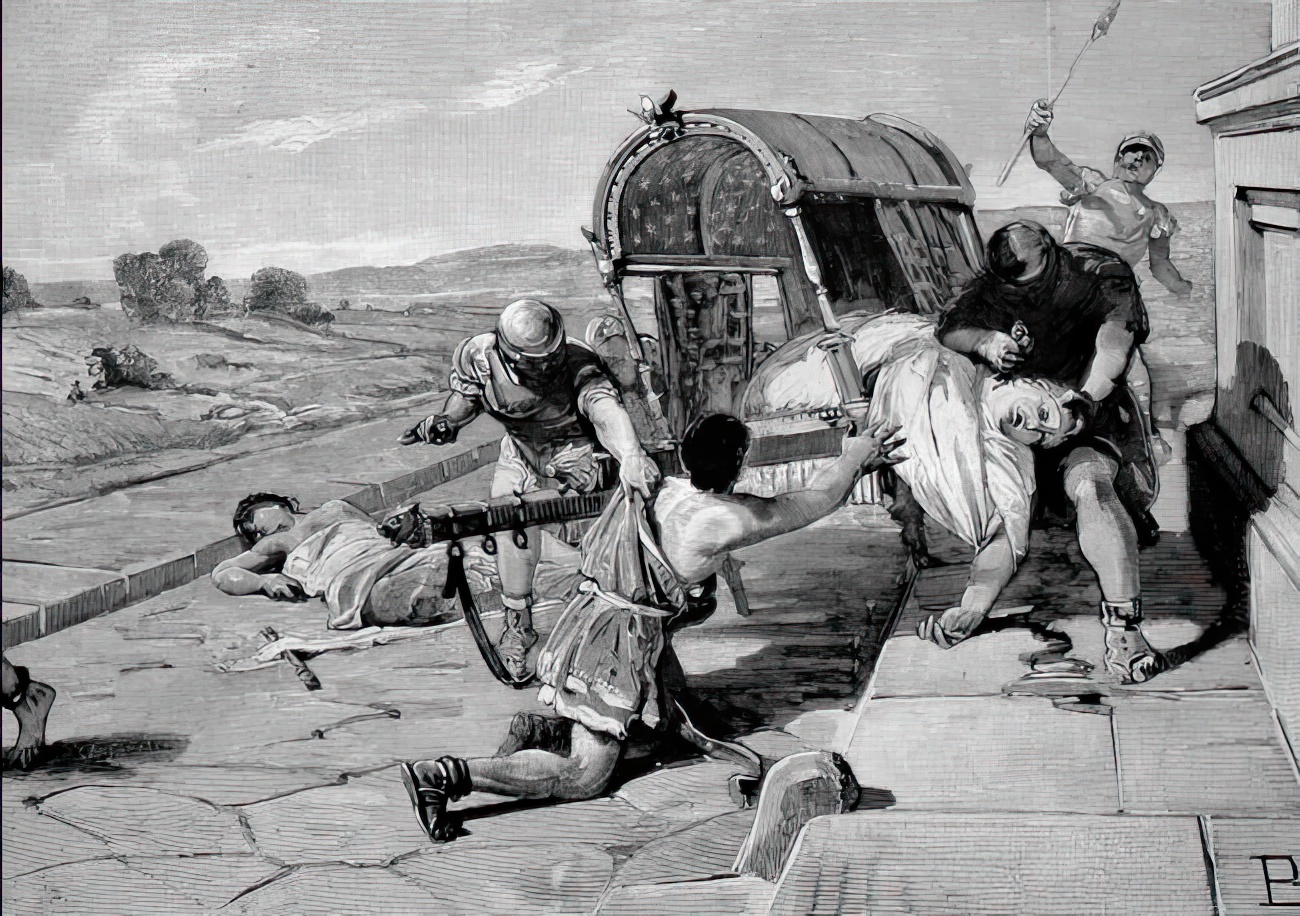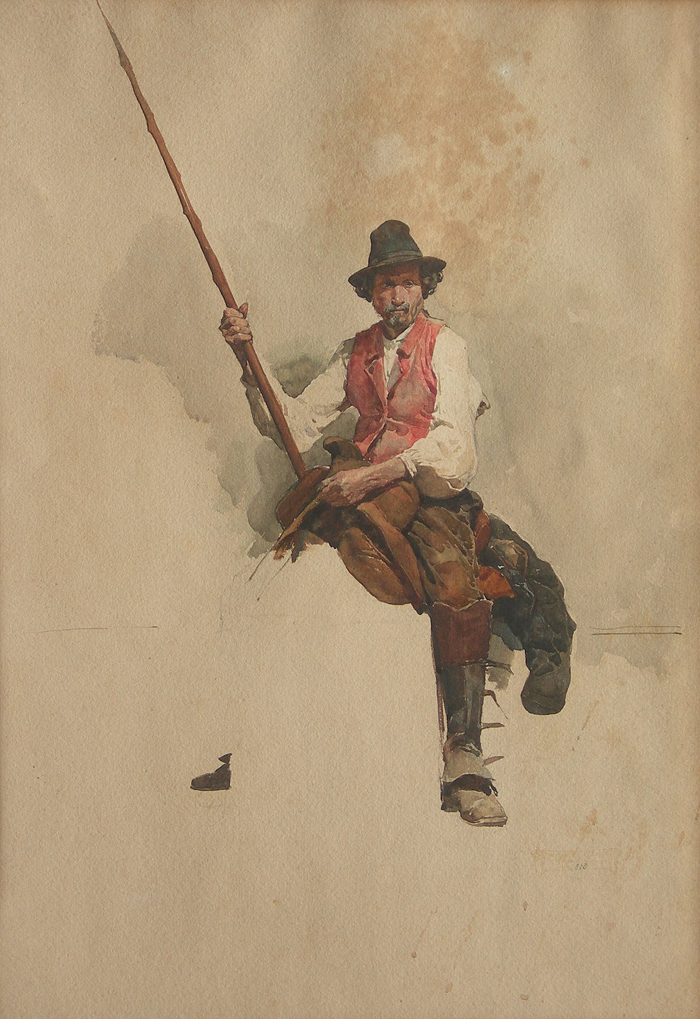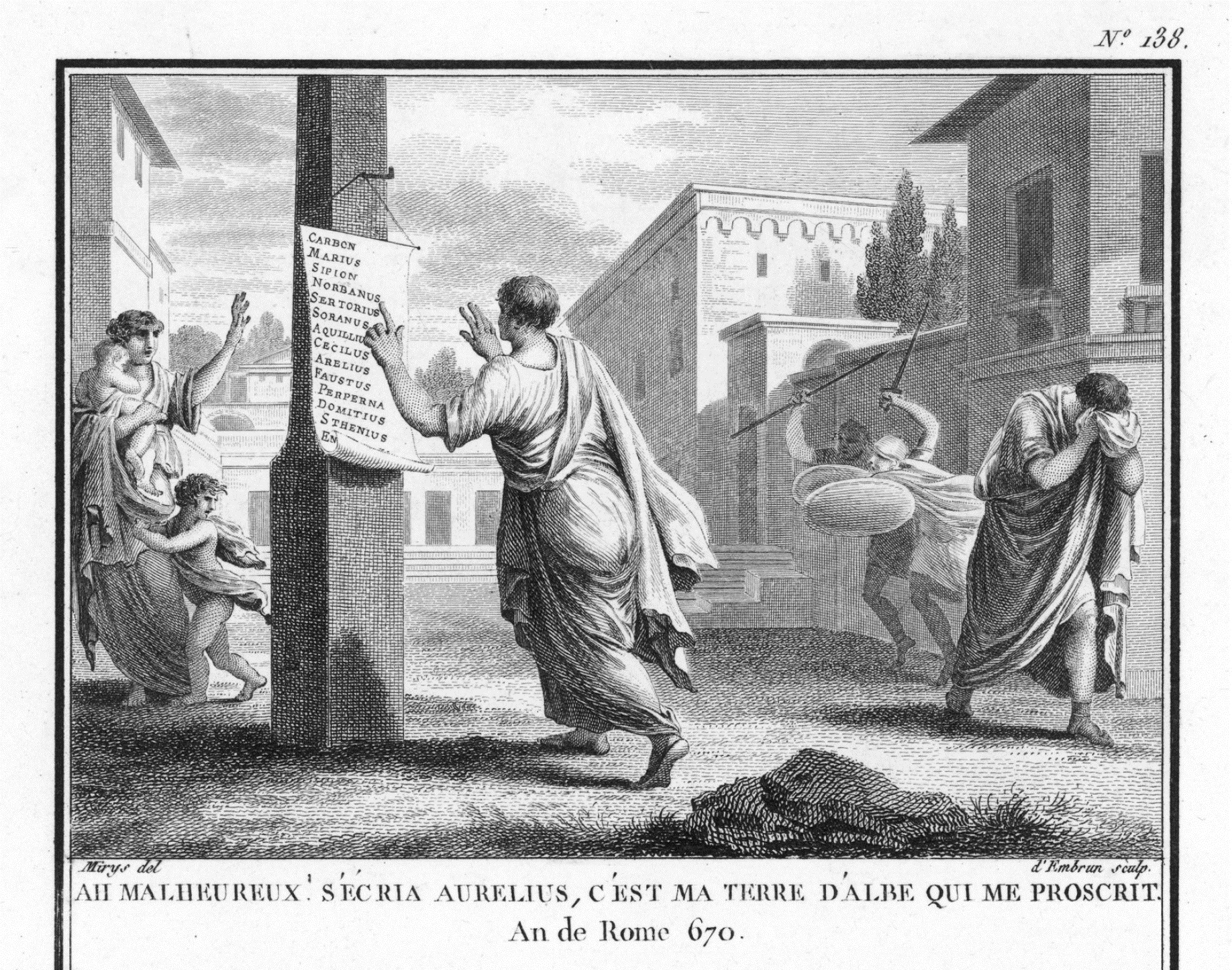|
Catiline
Lucius Sergius Catilina ( – January 62 BC), known in English as Catiline (), was a Roman politician and soldier best known for instigating the Catilinarian conspiracy, a failed attempt to seize control of the Roman state in 63 BC. Born to an ancient patrician family, he joined Sulla during Sulla's civil war and profited from Sulla's purges of his political enemies, becoming a wealthy man. In the early 60s BC, he served as praetor and then as governor of Africa (67–66 BC). Upon his return to Rome, he attempted to stand for the consulship but was rebuffed; he then was beset with legal challenges over alleged corruption in Africa and his actions during Sulla's proscriptions (83–82 BC). Acquitted on all charges with the support of influential friends in Roman politics, he stood for the consulship in 64 and in 63 BC. Defeated in the consular , he concocted a plot to take the consulship by force, bringing together poor rural plebs, Sullan vetera ... [...More Info...] [...Related Items...] OR: [Wikipedia] [Google] [Baidu] |
Catilinarian Conspiracy
The Catilinarian conspiracy, sometimes Second Catilinarian conspiracy, was an attempted coup d'état by Lucius Sergius Catilina (Catiline) to overthrow the Roman consuls of 63 BC – Marcus Tullius Cicero and Gaius Antonius Hybrida – and forcibly assume control of the state in their stead. The conspiracy was formed after Catiline's defeat in the consular elections for 62, held in early autumn 63. He assembled a coalition of malcontents – aristocrats who had been denied political advancement by the voters, dispossessed farmers, and indebted veterans of Sulla – and planned to seize the consulship from Cicero and Antonius by force. In November 63, Cicero exposed the conspiracy, causing Catiline to flee from Rome and eventually to his army in Etruria. In December, Cicero uncovered nine more conspirators organising for Catiline in the city and, on advice of the senate, had them executed without trial. In early January 62 BC, Antonius defeated Catiline in battle, pu ... [...More Info...] [...Related Items...] OR: [Wikipedia] [Google] [Baidu] |
Cicero
Marcus Tullius Cicero ( ; ; 3 January 106 BC – 7 December 43 BC) was a Roman statesman, lawyer, scholar, philosopher, orator, writer and Academic skeptic, who tried to uphold optimate principles during the political crises that led to the establishment of the Roman Empire. His extensive writings include treatises on rhetoric, philosophy and politics. He is considered one of Rome's greatest orators and prose stylists and the innovator of what became known as "Ciceronian rhetoric". Cicero was educated in Rome and in Greece. He came from a wealthy municipal family of the Roman equestrian order, and served as consul in 63 BC. He greatly influenced both ancient and modern reception of the Latin language. A substantial part of his work has survived, and he was admired by both ancient and modern authors alike. Cicero adapted the arguments of the chief schools of Hellenistic philosophy in Latin and coined a large portion of Latin philosophical vocabulary via ... [...More Info...] [...Related Items...] OR: [Wikipedia] [Google] [Baidu] |
Sallust
Gaius Sallustius Crispus, usually anglicised as Sallust (, ; –35 BC), was a historian and politician of the Roman Republic from a plebeian family. Probably born at Amiternum in the country of the Sabines, Sallust became a partisan of Julius Caesar (100 to 44 BC), circa 50s BC. He is the earliest known Latin-language Roman historian with surviving works to his name, of which ''Conspiracy of Catiline'' on the eponymous conspiracy, ''The Jugurthine War'' on the eponymous war, and the ''Histories'' (of which only fragments survive) remain extant. As a writer, Sallust was primarily influenced by the works of the 5th-century BC Greek historian Thucydides. During his political career he amassed great and ill-gotten wealth from his governorship of Africa. Life and career Sallust was probably born in Amiternum in Central Italy,.. though Eduard Schwartz takes the view that Sallust's birthplace was Rome. His birth date is calculated from the report of Jerome's '' Chronicon''.. ... [...More Info...] [...Related Items...] OR: [Wikipedia] [Google] [Baidu] |
Bellum Catilinae
''Bellum Catilinae'' (''War of Catiline''), also called (''Conspiracy of Catiline''), is the first history published by the Roman historian Sallust. The second historical monograph in Latin literature, it chronicles the attempted overthrow of the government by the aristocrat Catiline in 63 BC in what has been usually called the Catilinarian conspiracy. The narrative of the monograph was seized upon as illustrating the moral and social decadence of the ruling Roman classes, particularly the Roman Senate. Sallust continually critiques Roman corruption throughout his narration. Summary The history begins with a brief preface on the nature of man, history, and a brief autobiography of Sallust himself. Afterwards, Sallust launches into a character description of Catiline, who is portrayed as at once heroic and immoral, and then a description of Catiline's intention to gain kingship at any cost. However, Sallust tells his readership that Catiline's political ambitions were thwar ... [...More Info...] [...Related Items...] OR: [Wikipedia] [Google] [Baidu] |
Battle Of Pistoria
The Battle of Pistoria was fought early January 62 BC between the forces of the Roman Republic and Catiline, a senatorial conspirator who had been organising an attempted conspiracy against the consuls the previous year. After his conspiracy was uncovered in early November 63 BC and he was denounced by Cicero he withdrew from Rome and went north into Etruria to join forces with his man there, Gaius Manlius. After arriving there, Catiline took up magisterial insignia; he and Manlius were declared ''hostes'' by the Senate. It also assigned Gaius Antonius Hybrida – co-consul with Cicero for 63 BC – to lead an army against the insurrectionists. Antonius' campaign continued into the new year and he was prorogued as proconsul. After word of the conspiracy's collapse with the death of its leaders in Rome, Catiline tried to escape for Transalpine Gaul but was blocked by three legions under Quintus Caecilius Metellus Celer. With his escape route to Gaul blocked, he w ... [...More Info...] [...Related Items...] OR: [Wikipedia] [Google] [Baidu] |
Sergia Gens
The gens Sergia was a patrician family at ancient Rome, which held the highest offices of the Roman state from the first century of the Republic until imperial times. The first of the Sergii to obtain the consulship was Lucius Sergius Fidenas in 437 BC. Despite long and distinguished service, toward the end of the Republic the reputation of this gens suffered as a result of the conspiracy of Catiline.''Dictionary of Greek and Roman Biography and Mythology'', vol. III, p. 787 ("Sergia Gens"). Origin The Sergii claimed descent from Sergestus, one of the Trojans who came to Italy with Aeneas, a tradition mentioned by Vergil in the Aeneid. The etymology of the nomen ''Sergius'' is problematic. Chase hesitantly suggests a connection with the praenomen ''Servius'', probably from an old Latin root meaning to preserve or keep safe. He classifies the nomen with other gentilicia that either originated at Rome, or cannot be shown to have come from anywhere else. However, the cogn ... [...More Info...] [...Related Items...] OR: [Wikipedia] [Google] [Baidu] |
Cesare Maccari
Cesare Maccari (; 9 May 1840 – 7 August 1919) was an Italian painter and sculptor, most famous for his 1888 painting ''Cicerone denuncia Catilina'' (usually translated as ''Cicero Accuses Catiline'' or ''Cicero Denounces Catiline''). Early life Maccari was born in Siena, in the Grand Duchy of Tuscany. He was a student of the Institute of the Fine Arts in Siena together with Tito Sarrocchi, working in sculpture and helping complete the Monumento Pianigiani in Siena. He later worked in the atelier of Luigi Mussini in Florence. There in 1864 he was commissioned by an English society to copy works of Bernardino Pinturicchio found in the Cathedral of Siena. Some of his first patronage came from works the Marquis Pieri-Nerli, who also commissioned him to paint frescoes of the four evangelists for a private chapel in his home in Quinciano, a hamlet in the comune of Monteroni d'Arbia. Maccari soon won a stipend to study in Rome, that also allowed him to travel through Italy. Ma ... [...More Info...] [...Related Items...] OR: [Wikipedia] [Google] [Baidu] |
Sulla's Proscription
Sulla's proscription was a reprisal campaign by the Roman proconsul and later dictator, Lucius Cornelius Sulla, to eliminate his enemies in the aftermath of his victory in the civil war of 83–82 BC. Following his victory at the battle of the Colline Gate, Sulla wanted to take his revenge against the former supporters of Marius and Cinna, who had declared him a public enemy in 87 BC. After having obtained a positive vote from a popular assembly, he published two lists with the names of his enemies among senators and equites, the two tiers of the Roman aristocracy. The lists contained 520 names, of which 75 are known. Those on the lists had their lives and property forfeit; rewards were given to those who assassinated the victims. Several henchmen, as well prominent politicians who supported Sulla, massively profited from the proscription, collecting bounties and receiving seized properties at concessionary prices. The proscription was just one element of the repression or ... [...More Info...] [...Related Items...] OR: [Wikipedia] [Google] [Baidu] |
Marcus Licinius Crassus
Marcus Licinius Crassus (; 115–53 BC) was a ancient Rome, Roman general and statesman who played a key role in the transformation of the Roman Republic into the Roman Empire. He is often called "the richest man in Rome".Wallechinsky, David & Irving Wallace, Wallace, Irving.Richest People in History Ancient Roman Crassus. Trivia-Library. ''The People's Almanac''. 1975–1981. Web. 23 December 2009."Often named as the richest man ever, a more accurate conversion of sesterce would put his modern figure between $200 million and $20 billion." Peter L. BernsteinThe 20 Richest People Of All Time/ref> Crassus began his public career as a military commander under Sulla, Lucius Cornelius Sulla during his Sulla's civil war, civil war. Following Sulla's assumption of the Roman dictator, dictatorship, Crassus amassed an enormous fortune through property speculation. Crassus rose to political prominence following his victory over the Third Servile War, slave revolt led by Sp ... [...More Info...] [...Related Items...] OR: [Wikipedia] [Google] [Baidu] |
Roman Senate
The Roman Senate () was the highest and constituting assembly of ancient Rome and its aristocracy. With different powers throughout its existence it lasted from the first days of the city of Rome (traditionally founded in 753 BC) as the Senate of the Roman Kingdom, to the Senate of the Roman Republic and Senate of the Roman Empire and eventually the Byzantine Senate of the Eastern Roman Empire, existing well into the post-classical era and Middle Ages. During the days of the Roman Kingdom, the Senate was generally little more than an advisory council to the king. However, as Rome was an electoral monarchy, the Senate also elected new Roman kings. The last king of Rome, Lucius Tarquinius Superbus, was overthrown following a coup d'état led by Lucius Junius Brutus, who founded the Roman Republic. During the early Republic, the Senate was politically weak, while the various executive Roman magistrates who appointed the senators for life (or until expulsion by Roma ... [...More Info...] [...Related Items...] OR: [Wikipedia] [Google] [Baidu] |
Roman Republic
The Roman Republic ( ) was the era of Ancient Rome, classical Roman civilisation beginning with Overthrow of the Roman monarchy, the overthrow of the Roman Kingdom (traditionally dated to 509 BC) and ending in 27 BC with the establishment of the Roman Empire following the War of Actium. During this period, Rome's control expanded from the city's immediate surroundings to hegemony over the entire Mediterranean Sea, Mediterranean world. Roman society at the time was primarily a cultural mix of Latins (Italic tribe), Latin and Etruscan civilization, Etruscan societies, as well as of Sabine, Oscan, and Greek cultural elements, which is especially visible in the Ancient Roman religion and List of Roman deities, its pantheon. Its political organisation developed at around the same time as direct democracy in Ancient Greece, with collective and annual magistracies, overseen by Roman Senate, a senate. There were annual elections, but the republican system was an elective olig ... [...More Info...] [...Related Items...] OR: [Wikipedia] [Google] [Baidu] |
List Of Roman Governors Of Africa
Rome appointed governors of Africa from its conquest of Carthage in 146 BC until the province was lost to the Vandals in AD 439. The extent of 'Africa' varied time to time, but area/province encompassing and surrounding Carthage as a representative city of this region was always considered 'Africa' in a narrow sense. 146–100 BC Unless otherwise noted, names of governors in Africa and their dates are taken from T.R.S. Broughton, ''The Magistrates of the Roman Republic'', (New York: American Philological Association, 1951, 1986), vol. 1, and vol. 2 (1952). Inscriptional evidence is less common for this period than for the Imperial era, and names of those who held a ''provincia'' are usually recorded by historians only during wartime or by the ''Fasti Triumphales''. After the defeat of Carthage in 146 BC, no further assignments to Africa among the senior magistrates or promagistrates are recorded until the Jugurthine War (112–105 BC), when the command against Jugurtha in Numidia ... [...More Info...] [...Related Items...] OR: [Wikipedia] [Google] [Baidu] |







